 Petzlover
Petzlover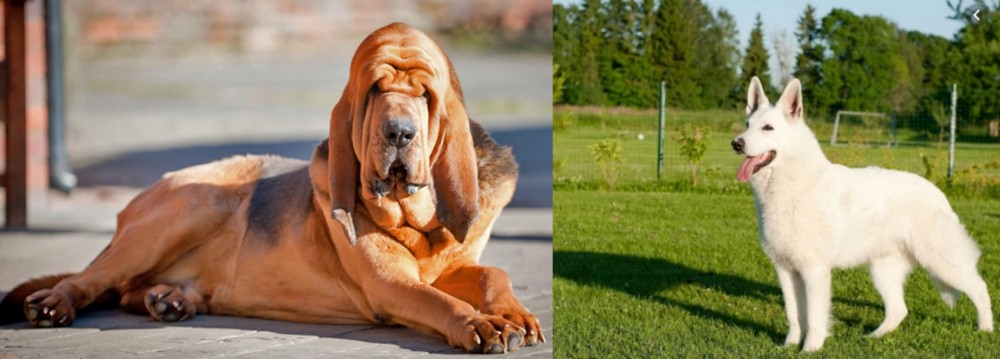 Bloodhound is originated from United Kingdom but White Shepherd is originated from United States. Bloodhound may grow 11 cm / 4 inches shorter than White Shepherd. Bloodhound may weigh 32 kg / 71 pounds more than White Shepherd. Bloodhound may live 6 years less than White Shepherd. Bloodhound may have more litter size than White Shepherd. Bloodhound requires Low Maintenance. But White Shepherd requires Moderate Maintenance
Bloodhound is originated from United Kingdom but White Shepherd is originated from United States. Bloodhound may grow 11 cm / 4 inches shorter than White Shepherd. Bloodhound may weigh 32 kg / 71 pounds more than White Shepherd. Bloodhound may live 6 years less than White Shepherd. Bloodhound may have more litter size than White Shepherd. Bloodhound requires Low Maintenance. But White Shepherd requires Moderate Maintenance
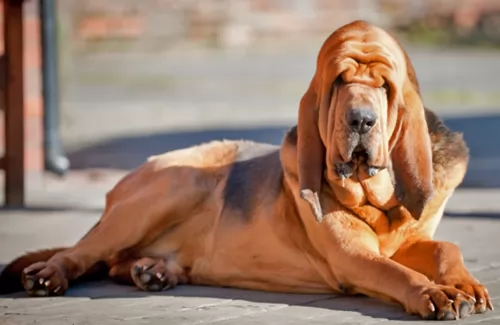 The history of the Bloodhound breed is a fascinating one. Known as a Sleuthhound for its ability to smell out the culprit and bag the prey. Even more so the Bloodhound is known for tracking and finding lost people. He is famous for finding human scents and being able to follow them even days or weeks after the person is lost. They are also able to track people over a great amount of land and have been known to successfully track escaped prisoners or wanted criminals. They are descended from the Saint-Hubert Hounds that were bred at the Abbey/Monastery at Saint-Hubert, Belgium. According to the legends the St. Hubert hounds were bred by the Monks in 1000AD. This hound was thought to be a mixed breed rather than a purebred. That’s because the ancestry of this hound is not really known but it is known that the monks bred them and sent several to the King of France annually. Only black hounds were gifted.
The history of the Bloodhound breed is a fascinating one. Known as a Sleuthhound for its ability to smell out the culprit and bag the prey. Even more so the Bloodhound is known for tracking and finding lost people. He is famous for finding human scents and being able to follow them even days or weeks after the person is lost. They are also able to track people over a great amount of land and have been known to successfully track escaped prisoners or wanted criminals. They are descended from the Saint-Hubert Hounds that were bred at the Abbey/Monastery at Saint-Hubert, Belgium. According to the legends the St. Hubert hounds were bred by the Monks in 1000AD. This hound was thought to be a mixed breed rather than a purebred. That’s because the ancestry of this hound is not really known but it is known that the monks bred them and sent several to the King of France annually. Only black hounds were gifted.
Some kings preferred not to hunt with these hounds thinking them not good enough while others thought the only use for them was as a leash hound. All described the St. Hubert as long in body with short legs. These gifts continued until the French Revolution when hunting in France was greatly reduced until the 19th century. The original St. Hubert strain became extinct in the 19th century and that the current European St. Hubert hound has its origins in the Bloodhound. The Bloodhound as a separate breed was already established in Europe by the middle of the 14th century. They were used as leach hounds to sniff out the prey so that the pack hounds could chase and keep it “at bay”. They were also used from the beginnings of the breed to track humans. At this time they were often known as sleuth hounds. As recorded by John Caius – the authority on Bloodhounds from their origins – writes about the breeds ability to find and track the scent of blood – thus becoming the Bloodhound and its use to track poachers and thieves. He also reported that the Bloodhound and the Sleuth Hound were the same basic breed. The number of Bloodhounds in Britain gradually declined until few remained after World War II. Britain has gradually built their breed back up by importing dogs from America. It was during the 19th century that the Bloodhound was imported into France by breeders who wished to reestablish the St. Hubert Hound. Thus the St. Hubert is both the ancestor and descendent of the Bloodhound. The Britain’s continue to believe that the Bloodhound is a native British breed.
The Bloodhounds in America have had great success as companion animals, with police departments and forest rangers and showing in the prestigious Westminster Kennel Club in New York. There are more Bloodhounds in the United States than anywhere else in the world.
In the end the Anglo-Saxton Bloodhound cannot be specified with any real certainty. Many believe it was not the St. Hubert that the Bloodhound descended from but rather the Norman hound or the sleuth-hound. Many believe it could have included other breeds such as the southern hound, the dun-hound and the Talbot. It cannot be proven today it the Bloodhound’s origins come from Belgian or England.
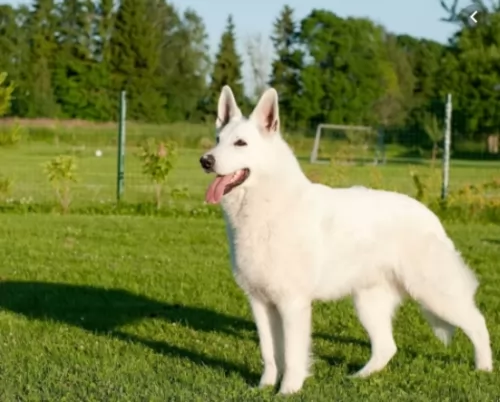 The German Shepherd and the white German Shepherd are the same dog - the only thing is that their coat colors vary.
The German Shepherd and the white German Shepherd are the same dog - the only thing is that their coat colors vary.
The White Shepherd evolved because people were looking for a working companion dog with a high degree of intelligence and a white coat.
The development of the White Shepherd began at the time of the 19th and 20th centuries. A breeding program was started but in 1933, the white coat color was made a disqualification in the German Shepherd Dog breed standard.
Not to be deterred, it was in 1969 that the U.S. and Canada formed White German Shepherd breed clubs and the breed was actually recognized by the UKC in 1999.
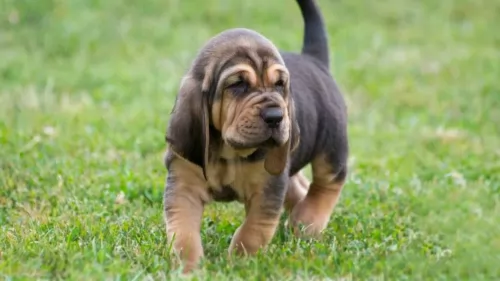 When being judged for confirmation in a show ring, the preference is for a larger dog, with an unusual skeleton in respect to its large size and heavy weight in the bones. They have a narrow head, flat at the sides, but long. They have deep set eyes buried in the deep, long face and wrinkles. The eyes might be yellow or run the gamut to deep hazel depending upon the color of the dog. The long velvety ears and thin and low set on the head. These long ears are as much a part of the Bloodhounds Olfactory system as his amazing nose. They curl backward and inward as the ends. There is a large amount of loose skin on the head and at the jowls. When the Bloodhound lowers his head the loose folds and ridges of skin are prominent on the face and forehead.
When being judged for confirmation in a show ring, the preference is for a larger dog, with an unusual skeleton in respect to its large size and heavy weight in the bones. They have a narrow head, flat at the sides, but long. They have deep set eyes buried in the deep, long face and wrinkles. The eyes might be yellow or run the gamut to deep hazel depending upon the color of the dog. The long velvety ears and thin and low set on the head. These long ears are as much a part of the Bloodhounds Olfactory system as his amazing nose. They curl backward and inward as the ends. There is a large amount of loose skin on the head and at the jowls. When the Bloodhound lowers his head the loose folds and ridges of skin are prominent on the face and forehead.
For many centuries all different colors of Bloodhounds could be found. Today however they are pretty much red, black and tan and black and liver. The Bloodhound is a powerful dog and is larger than most breeds of hounds.
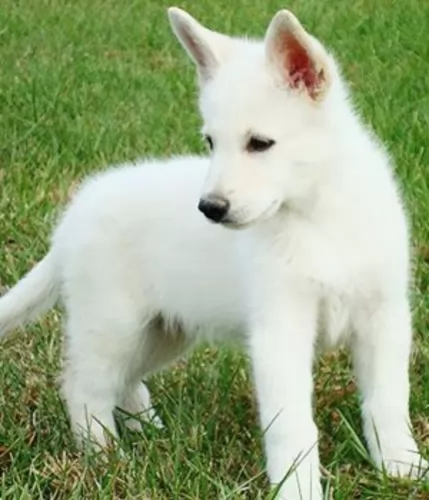 The White Shepherd is a true beauty and is a medium to large-sized dog that is muscular and strong. He stands at between 55 and 65cm in height and weighs between 35 and 40kg.
The White Shepherd is a true beauty and is a medium to large-sized dog that is muscular and strong. He stands at between 55 and 65cm in height and weighs between 35 and 40kg.
He is somewhat longer than tall. The double coat is medium length, dense, straight and white. He is a fairly heavy shedder. He has an intelligent face, a long muzzle and erect ears. The long tail is low-set.
This beautiful dog’s face tells you that he is highly intelligent. He can be easily trained. The bright eyes are eager and alert and he is ready to be an excellent guard dog and take his role as protector and guardian seriously.
The White Shepherd loves his human family and isn't overly enthusiastic around strangers. They’re playful dogs and will make great playmates for children. They also aren’t aggressive with other dogs and will get on well with other pets in the house.
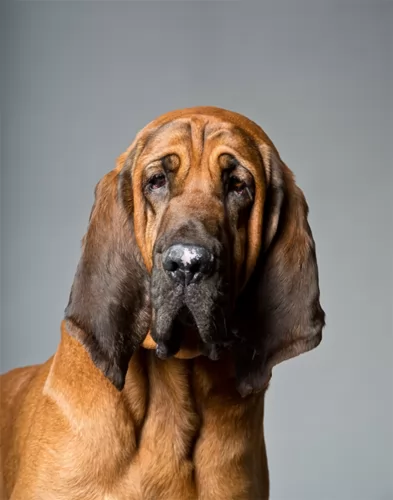 The Bloodhound is known as a gentle soul and he truly is. They are affectionate and gentle with people and children. However, their strong will to track can make them stubborn and hard to handle and train. They are easy going dogs and really like to be with people, children and other dogs. They are affectionate but tend to be set in their ways.
The Bloodhound is known as a gentle soul and he truly is. They are affectionate and gentle with people and children. However, their strong will to track can make them stubborn and hard to handle and train. They are easy going dogs and really like to be with people, children and other dogs. They are affectionate but tend to be set in their ways.
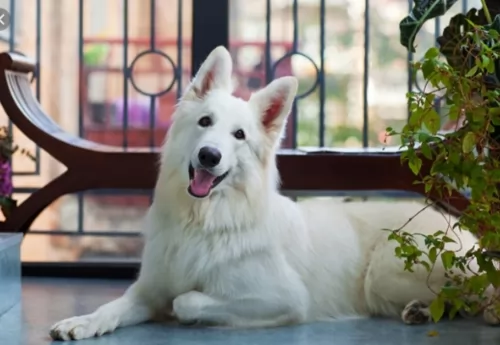 The White Shepherd is such a beautiful dog and he has some great characteristics to match his good looks.
The White Shepherd is such a beautiful dog and he has some great characteristics to match his good looks.
He is friendly and amicable with his human family and is a great protector as well. He isn’t aggressive yet he makes a great watchdog.
He is loving and loyal and forms strong bonds with his human family. Bringing him into your home and heart is guaranteed to confirm the opinion held that dogs are man's best friend.
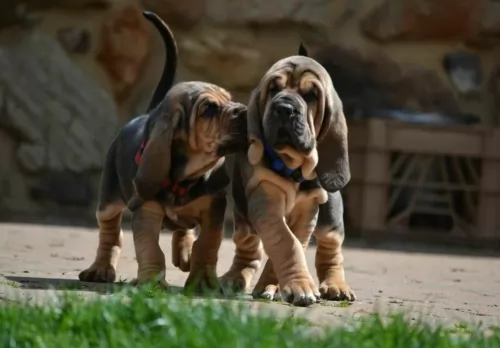 Obviously with ears like the Bloodhound there is always a chance for problems and serious infections. The ears need to be cleaned daily. Because their coat is so thick, they can overheat easily, and they are very prone to bloat, as are many large animals. However, with the Bloodhound, Bloat is the number one killer. Their lifespan is one of the shortest of all dogs at 6.75 years.
Obviously with ears like the Bloodhound there is always a chance for problems and serious infections. The ears need to be cleaned daily. Because their coat is so thick, they can overheat easily, and they are very prone to bloat, as are many large animals. However, with the Bloodhound, Bloat is the number one killer. Their lifespan is one of the shortest of all dogs at 6.75 years.
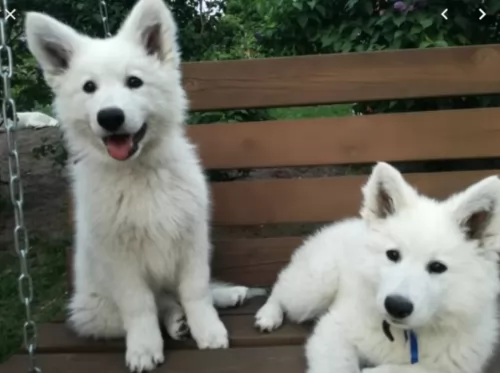 The White Shepherd shares health problems much the same as the German Shepherd, and one of these is hip dysplasia.
The White Shepherd shares health problems much the same as the German Shepherd, and one of these is hip dysplasia.
These dogs are at risk of getting hip dysplasia. It’s a congenital disorder with dogs inheriting the disease from their parents. Some young dogs can get the disease too. Because they are such active dogs, the White Shepherd is at risk of dysplasia. There are a number of signs you can look for in your dog and some of these are -
Your vet may want x-rays to examine your dog's hips. Your vet will want to slow the development of the disease and also ease the pain in your pet. There are other steps the vet will suggest to you that can make it as comfortable as possible for your pet.
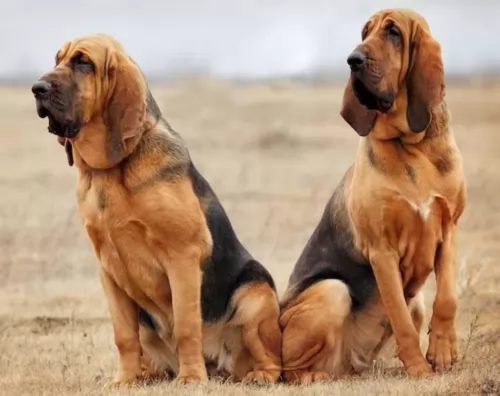 The Bloodhound is not a high energy, fast moving dog but that does not mean he doesn’t have serious nutritional needs. An overweight Bloodhound is on a course to an early demise. They should be fed a high-quality food once a day or split into two daily servings. Do not feed them right before or right after strenuous exercise and remember that strenuous exercise for a Bloodhound is considerably less than it is for a terrier.
The Bloodhound is not a high energy, fast moving dog but that does not mean he doesn’t have serious nutritional needs. An overweight Bloodhound is on a course to an early demise. They should be fed a high-quality food once a day or split into two daily servings. Do not feed them right before or right after strenuous exercise and remember that strenuous exercise for a Bloodhound is considerably less than it is for a terrier.
As previously mentioned the number one cause of death in Bloodhounds is Bloat. They are also prone to cancer. They have minor issues with their eyes, but their ears and skin are also major concerns. Clean the ears daily and wipe out the skin folds and wrinkles to prevent infections. They should be test for hip and elbow dysplasia simply because they are large dogs, though these conditions are less common in Bloodhounds.
Though the Bloodhound is known as a couch potato his stamina and activity levels are usually greatly underestimated. He can follow a scent for 7-10 hours over miles of terrain with out a problem. He needs daily exercise such as long walks on a leash. Do not take your Bloodhound out off leash because if he picks up a scent and wanders off you will not be able to get his attention to call him back.
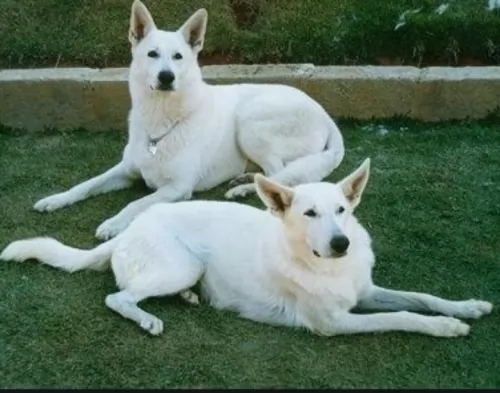 The White Shepherd's weather-resistant double coat will need to be brushed regularly as he is quite a heavy shedder. When brushing him, check for ticks and fleas as well as any unusual lumps.
The White Shepherd's weather-resistant double coat will need to be brushed regularly as he is quite a heavy shedder. When brushing him, check for ticks and fleas as well as any unusual lumps.
This beautiful dog was developed from a herding breed so he is very active. He will love a walk every day but that won’t be sufficient. He just loves ball games, and if you take him to the park, he’ll love you throwing sticks for him or the frisbee.
Because of his intelligence, he will require mental and physical stimulation. You get some toys for dogs where you can put some kibble in the toy and he has to figure out a way to get the food out.
The White Shepherd is an active dog, so to keep him that way, ensure he gets good food which has the right balance of vitamins.
There are good commercially manufactured dog foods on the market, but the idea is to know how to choose the high-quality ones and to avoid the ones that can actually jeopardize your dog’s health.
Always read the write-up on the packaging and choose according to your pet’s age and his activity levels.
It is always a good idea to give such a dog some home-made food too. Not any kind of home-made food either because you have to be careful with dogs to avoid them suffering from abdominal pain. They like their food plain and simple – boiled chicken, brown rice and vegetables.
Some raw meat occasionally is also good. Don’t forget to ensure a constant supply of cool, fresh water.